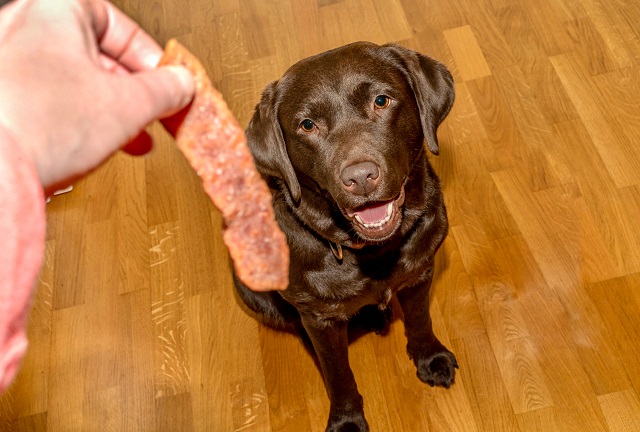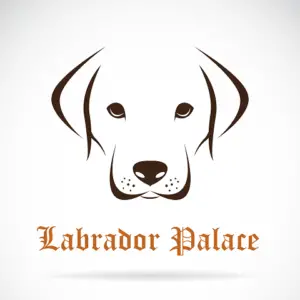There seems to be a tendency for some Labradors to eat every meal as if it might be their last for months. However, most of the time, this behaviour is learned.
Dogs found or rescued from shelters may well have been denied food and may be driven to find food and swallow it as quickly as possible before it disappears
Well-fed dogs have likely discovered the secret to getting treats: begging. It’s also possible that you’re overfeeding them during dinner.
While it is fun to watch our Labrador Retrievers get involved in their favourite treats, overfeeding can result in them literally feeding them to death. Researchers have discovered that Labrador retrievers beg for treats more often than other breeds and are generally food-obsessed. There’s a specific gene mutation they have that makes them different from everyone else. This is the first study of its kind to directly link obesity with dogs.
In addition to weight gain and several other health issues, too many treatments and too much food at dinner can lead to weight gain.
Keeping your Labrador Retriever active and healthy by providing the correct balance of nutritious food and health care is essential.
Despite the fact that most Labradors are merely food-motivated, excessive hunger may be a symptom of a wide range of health issues.
Insatiable hunger can be caused by the following health conditions:
How To Stop Your Labrador From Begging?
These are some things you might do to adjust your Labrador Retriever’s behavior if they are begging for food from you:
| Before you feed yourself, feed your lab: Furthermore, this way, they’re more likely to feel satisfied after seeing you eat, since they won’t be hungry. |
| Do not pay attention to your Labrador Retriever: Avoid giving in to your begging Lab. It is important that everyone living with you and your Lab follows the same rules. When your Labrador Retriever begs, don’t let visitors give him food. |
| Restricting the availability of food: When preparing food or eating, you should keep your Lab out of the dining area. Consider using a child barrier. Place them in their crate if they are crate-trained. |
| When your Labrador Retriever is begging at the dinner table, tell them to lie on the floor or go to their bed. By doing this, they will learn to be patient. |
| Provides rewards for your Lab not begging. Whether or not your Lab makes it through dinner without begging for food. |
Medical Issues That Makes Your Labrador Retriever Always Hungry
When there have been no obvious changes in your house recently and your Labrador Retriever is more hungry than normal, the most likely cause could be a medical problem. The main reasons are given below.
Diabetes Making Your Labrador Hungry
Despite eating a balanced diet, your Labrador Retriever can still develop diabetes. Similarly to diabetes in humans, your lab’s body stops producing adequate insulin or cells cannot use the insulin produced.
Diabetes mellitus is the result of either issue, leading to excessive thirst and urination, along with intense appetite and weight loss. The use of insulin therapy is usually necessary throughout your Labrador Retriever’s life to stabilize the level of sugar.
The Two Major Symptoms Of Dog Diabetes
| Appetite increase paired with weight loss: Sugars cannot reach the cells when this occurs, and the body cannot use the food it absorbs as fuel efficiency. Your Lab’s hunger will never be satisfied even if they have a normal appetite. Weight loss will always be a factor. |
| Excessive thirst and urination: Due to the escape of a large amount of sugar from the bloodstream, a lot of sugar ends up in the urine. That reduces blood volume as well. This leads to an increase in urination and urine output. In order to compensate for higher urination losses, the body consumes more water. Sugar-inducing bacteria in the urine and urinary infections are also common findings. |
How Is It Treated
In the long run, if your Lab has diabetes, it will often be managed with insulin injections to help the body’s impaired cells use sugar more efficiently.
The effects of dietary changes can also be countered by preventing rapid rises in blood sugar levels. However, insulin injections are usually initiated at the time of diagnosis and continue for the duration of the illness.
When their diabetes is well controlled, dogs often live an active, happy and healthy life. Still, insulin treatment and daily monitoring at home and by your veterinarian are essential for the rest of your Labrador Retriever’s life.

Tumors Making Your Labrador Hungry
The gastrointestinal tracts of Labrador Retrievers can be damaged by cancers of the gastrointestinal tract, such as adenocarcinoma and leiomyosarcoma. Because many of these forms of cancer cause malabsorption of nutrients, they can increase appetite.
Symptoms Of Cancerous Tumors In Your Labrador Retriever
If your Labrador Retriever displays any of the following symptoms, then have them tested by your veterinarian. Fortunately, there’s no serious problem, but if it’s cancer, it’s better to catch it early for a better diagnosis and treatment.
| Weight Loss: You should have your Labrador Retriever checked by a veterinarian if it is losing weight suddenly. If your Lab is losing weight but has not altered its dietary habits, it may be suffering from a serious illness, possibly cancer. |
| Change in Appetite: Cancer symptoms may include a lack of appetite or extreme appetite. Your Labrador metabolism can be altered by tumors, affecting their interest in food. There are types of cancer that cause vomiting and loss of appetite, while others increase appetite and metabolism. |
| Decreased Activity Level: Changes in activity levels are normal as we age, as well as changes in the environment. Even so, if your Lab seems to be lacking in much of the enthusiasm they once had for things like game playing, long walks, socializing with other animals and family members, or even snuggling, this could suggest a more serious problem and warrants investigation. |
How Is Cancerous Tumors Treated
The type of cancer and other factors relevant to your Labrador Retriever will determine the specific treatment for your pet. In addition to chemotherapy, radiation, or surgery, your veterinarian may prescribe other treatments as well.
Cushing’s disease Making Your Labrador Hungry
Symptoms of excessive cortisol in the blood are included under the umbrella of Cushing’s disease. Two small glands located near the kidneys release cortisol, which is a steroid hormone. Stress allows the body to function effectively if cortisol is secreted to boost blood sugar levels.
Symptoms of Cushing’s Disease
A dog’s chances of developing Cushing’s disease increase during their middle age. Symptoms of Cushing’s disease are not always noticeable in the early stages of the disease. Symptoms you may see in your Labrador Retriever included:
| Hair Loss | Recurrent Skin Infections |
| Reduced Activity | Thin Or Fragile Skin |
| Increased Thirst | Excessive Panting |
| Increased Appetite | Increased Urination |
How Is Cushing’s disease Treated In Dogs
Veterinary practitioners often use medications to manage Cushing’s syndrome. Cushing’s disease is “effectively treated” by removing the adrenal tumour if the tumor has not spread and the disease is adrenal-dependent.
In spite of this, the majority of cases are treated with drugs due to the complexity and difficulty of the procedure.
The frequency of regular blood tests and veterinarian examinations depends on your lab’s reaction to treatment and drug sensitivity. Blood tests and veterinarian examinations should begin within months of starting treatment and be repeated thereafter.
Intestinal Malabsorption Making Your Labrador Hungry
There are certain conditions in the small intestine or the pancreas that cause intestinal malabsorption. Even if your Lab is well fed and even if it eats well, it will not receive the essential nutrients from the food. This results in health issues, weight loss, or other problems.
The most serious symptom is chronic diarrhoea. You must take your Lab to the nearest vet if your Lab shows these symptoms.
Symptoms of Intestinal Malabsorption In Dogs
| Poor Coat | Vomiting |
| Flatulence | Lack of Energy |
| Frequent Smelly Poo | Noisy Stomach |
| Weight Loss | Eating Unusual Things |
How Is Intestinal Malabsorption In Labrador Treated
Regarding the treatment to be given, it depends on the source of the issue. Villous atrophy can be treated with a gluten-free diet if your Labrador Retriever is diagnosed with the condition. There are a number of oral antibiotics available to treat bacterial overgrowth.
The most popular antibiotics are oxytetracycline, metronidazole, and tylosin. You may also need to change your Lab’s diet.
You can significantly improve your Labrador Retriever’s health and wellbeing by using live yogurt and probiotics in their diet. Your Lab will be treated for the rest of their lives by consuming a balanced diet, taking daily medications, and taking supplements.

